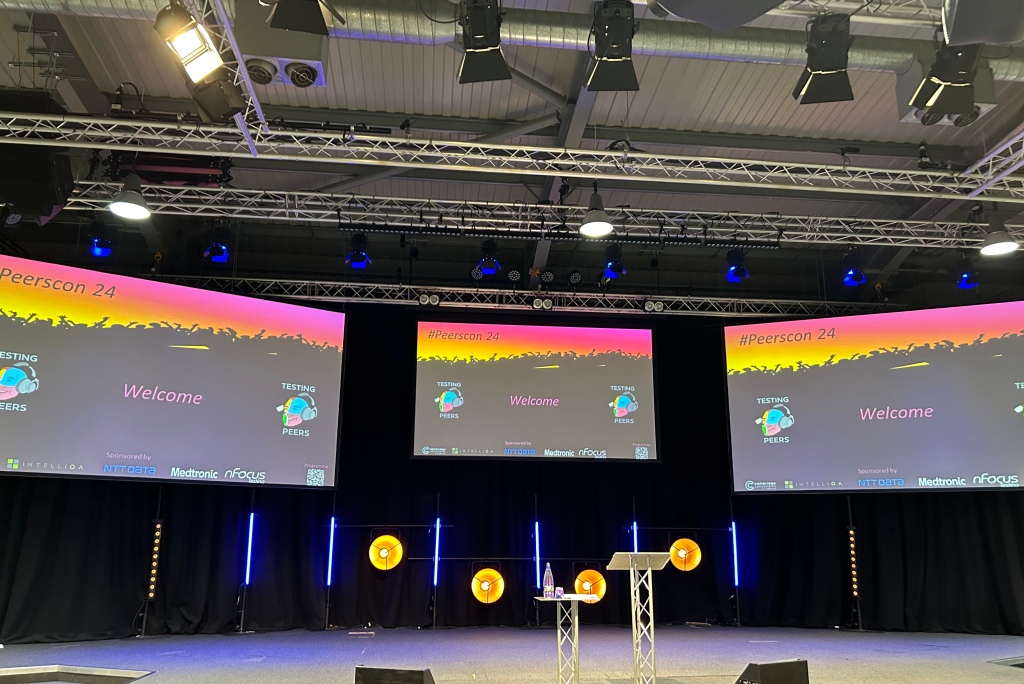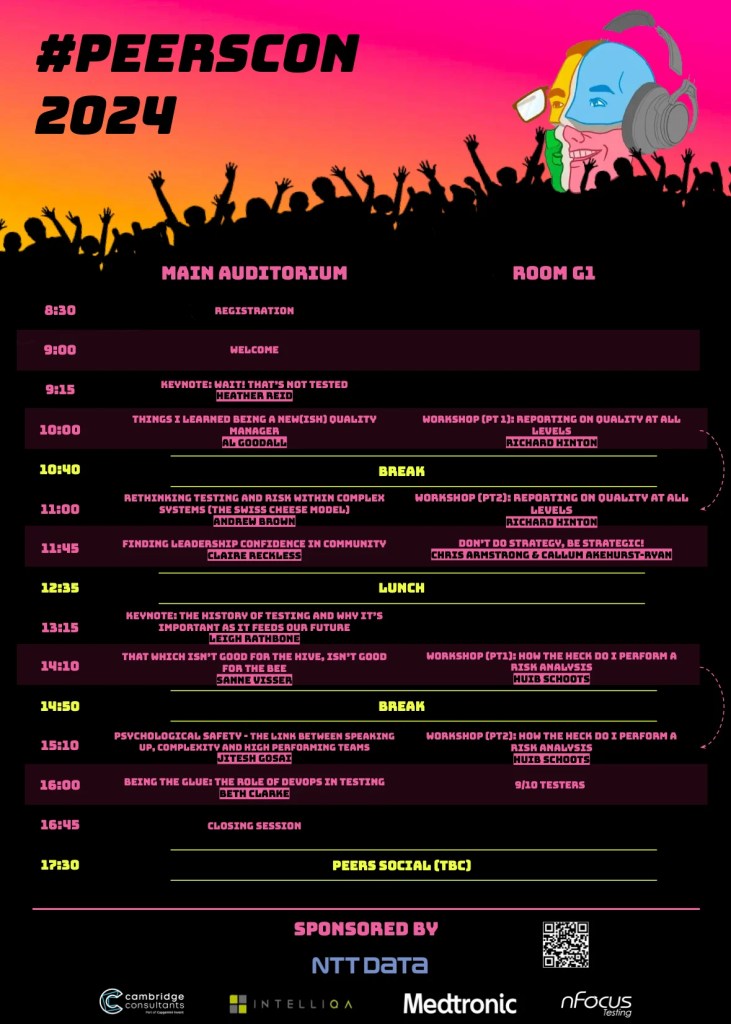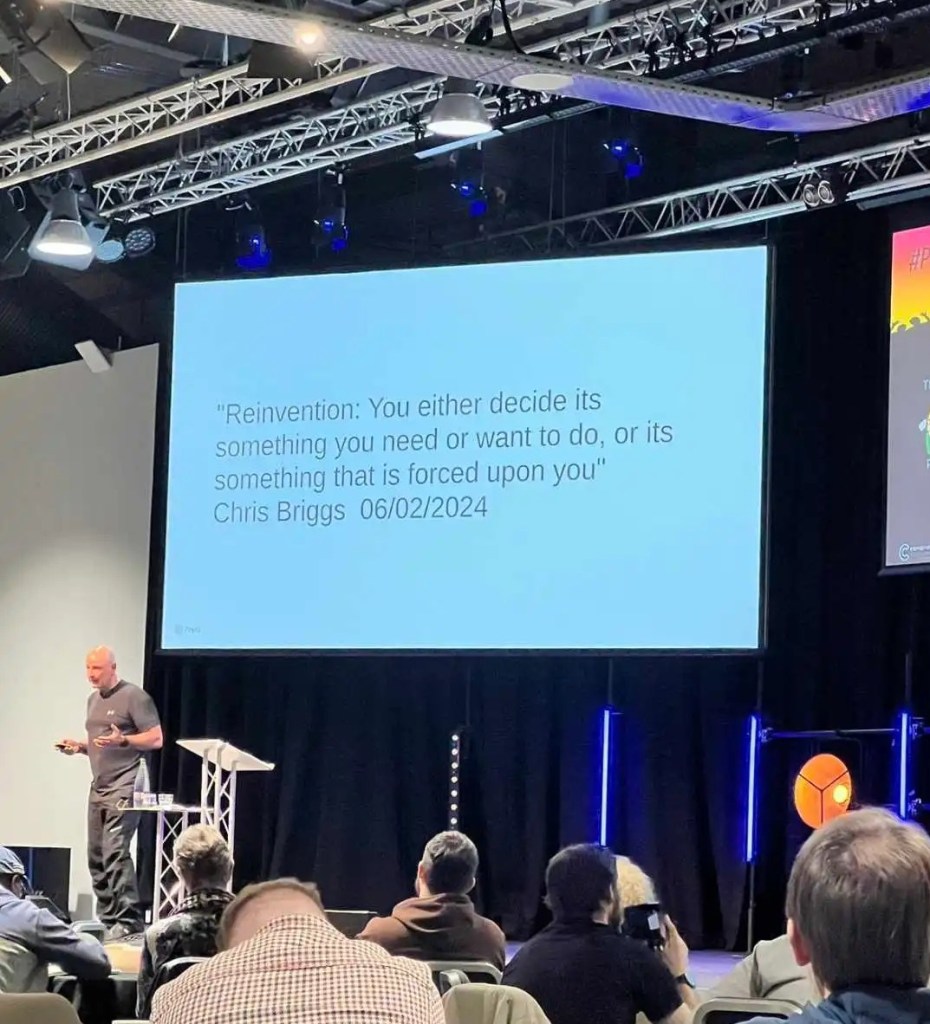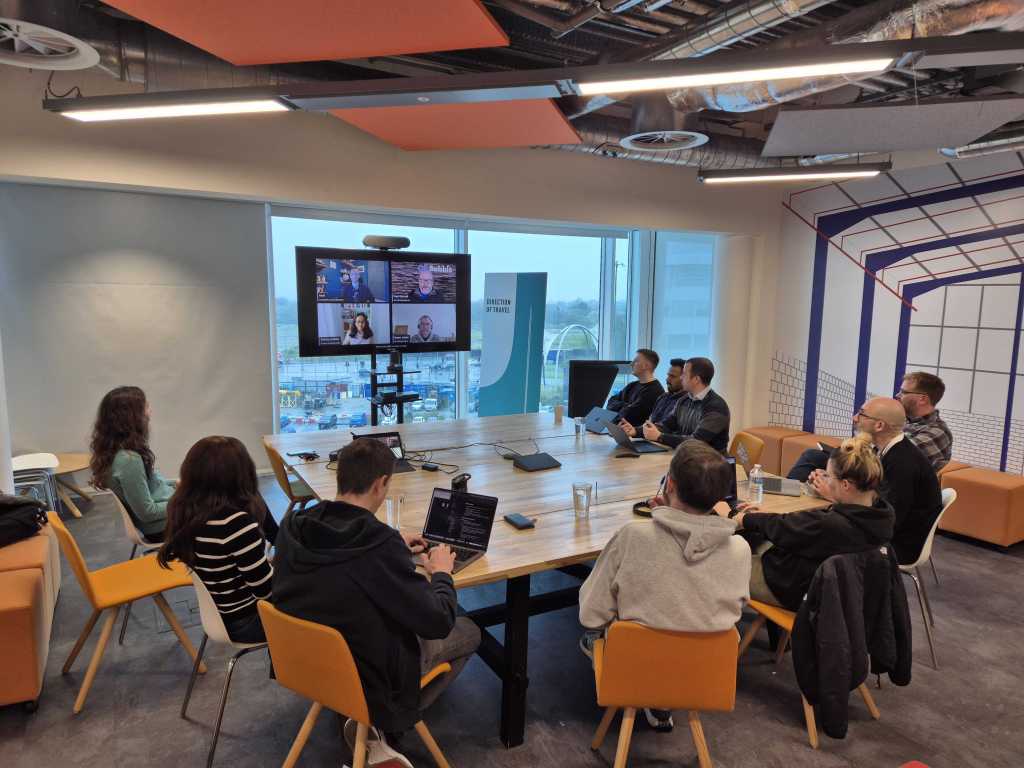I’ve been attending test-focused meetups in the North West for a couple of years now. But on the 14th of March 2024, I attended my first testing conference.
Not only was this my first testing conference, but it was the first year for the Testing Peers Conference.
It was excellent.
This post is for people who have never been to a testing conference, don’t know what to expect, and maybe don’t even know why they should bother.
Why Attend a Testing Conference?
I should start with a health warning – this is idiosyncratic.
These are my motivations:
New Ideas: exposure to new ideas, challenging concepts, and alternative ways of working are highly stimulating for me. I never met a good idea I didn’t want to ‘borrow’, and this was an opportunity to hear from so many within the community. To say nothing of the unplanned, incidental conversations providing a chance to expand my horizons. Each new idea is grist for the mill after all.
Networking: informal networks between like-minded, proactive, and motivated professionals allow you to support one another, share opportunities, and test out new ideas. The face-to-face contact from conferences, also gives you a chance to build interpersonal relationships. This is something of even greater significance when working in a sector and discipline that can leave you feeling isolated and disconnected from your peers.
Profile: an opportunity to widen professional-social connections, to share and promote your ideas (and brand) helping to raise your profile in the community. Except it isn’t only about your profile, but in discussing, sharing, and highlighting positive quality practices and innovations in your workplace, your employer’s brand and profile can be promoted.
Low cost: this can’t be said for all conferences. Many are expensive – often with good reason – but via a combination of sponsorship and keeping costs down, tickets for this conference were £20 (or £15 if you bought an Early Bird ticket).
Recharge the battery: you can probably tell, even before you finish reading this post, that I get a great deal from attending community events. The personal interaction and engagement with big ideas revitalises and recharges me.
Work can be tiring. Promoting change can be exhausting. But being surrounded by other, vibrant, and engaged professions recharges my batteries and renews my desire to contribute to positive change in my workplace where ever and however I can.
The Venue
Set at the Trent Conference Centre, the venue was excellent. Given it was the first year for this conference, and the low ticket cost, my expectations were tempered.
I was blown away by what I saw:

The whole day from start to finish was executed with a slick professionalism that belied the fact that this was the conference’s first year. The organisers, the VolunPeering team, and the venue staff were brilliant in faciliating a well run day.
The Day
Beginning with attendee registration and the chance to grab a coffee, the day unfolded exactly as expected set out in the programme below:

The event could be characterised as single-track with intermittent workshops/events at a secondary location.
Confession – I didn’t venture beyond the Auditorium so I can’t say what the workshops were like. However, based on feedback from attendees who did go, they sounded really very valuable.
Settling Down
In the main auditorium there were lots of tables with unassigned seating. Possibly a source of anxiety for some, but I was pleased to have the chance to meet some entirely new people.
I joined a group of professionals from IBM and ClearScore. As we mingled and chatted, discussing ‘The State of Quality’, in our respective workplaces, I was struck both by the richness and variety of opinions, and practices, as well as how motivated everyone was to improving quality in their respective domains.
The Conference
You can read all about the origins of the conference and the preceeding (and continuing) podcast ‘Testing Peers‘ separately, but one of the organisers – Simon Prior – introduced the organising committee, as well as the values and goals driving the conference. Namely that this is a place for peers within the software testing community to gather, commune, and share ideas generally – but not exclusively – around the themes of:
- Leadership
- Testing
- Quality
Throughout the day the speakers on the programme delivered on this promise and more.
Key Takeaways
Over the course of the day as the speakers took to the stage, each talk was by turn engaging, illuminating, thought-provoking, and, at times, challenging. Every talk was compèred by Simon Prior, and then followed by a Q&A session to the floor.
Here are my key takeaways from the day:
Wait! That’s Not Tested by Heather Reid
By turns vulnerable and revealing, but with hard, pragmatic edges and brilliant practical takeaways, Heather gave a talk using two alternative delivery approaches to illustrate the value that could be gained by ensuring that iterative releases give the customer what they actually need (as well as a mechanism for gaining user feedback) rather than what it is assumed they want.
Conceptualising the cost of each slice, emphasising a slice as ‘something that gives value to someone’, seems like a great brass-tacks way of tackling the continued preference that I observe in the workplace for big-bang solutions with minimal customer feedback loops.
Things I Learned Being A New(ish) Quality Manager by Al Goodall
Drawing on his experience progressing into increasingly senior quality leadership roles, Al (in his first ever conference talk) gave a candid account of the steps he has taken to becoming a better leader, as well as some of his mistakes, learnings, and key observations that he shared from the stage.
I loved the ownership that Al displayed to ensure he gained the right tools in order to lead effectively.
Rethinking Testing and Risk Within Complex Systems (The Swiss Cheese Model) by Andrew Brown
Weaving together the real-life story of the ‘Gimli Glider‘, principles gleaned from a paper entitled ‘How Complex Systems Fail‘ by Richard Cook, and observations from the experience of testing complex systems, Andy gave an entertaining and insightful talk on risk, and the conditions needed for disaster to manifest within your systems as illustrated via the ‘Swiss Cheese Model of Risk‘.
This talk was unusual in that there was explicit ‘homework’ given to attendees, and that was to read and digest the paper on ‘How Complex Systems Fail‘ – linked again – well worth a read.
Finding Leadership Confidence in Community by Claire Reckless
If there was one talk during the conference that highlighted the power of community to help people settle, grow into roles, and feel a sense of empowerment and belonging it was this one.
Honest and vulnerable, Claire articulated fears and concerns that anyone who has ever left their comfort-zone can relate to.
The aspect that resonated most accutely with me was the line (paraphrasing here) ‘…not being considered technical enough is triggering for me…’. As I have grown into my current role, that anxiety of not being technical enough persists – albeit a diminishing worry. It is a statement that I hear (in one form or another) from many peers and colleagues.
The History of Testing and Why It’s Important As It Feeds Our Future by Leigh Rathbone
Well, it was billed as a talk that would re-energise the room post-lunch. It certainly delivered!
Leigh gave a whistle-stop tour of his time in tech, the trends he has witnessed, and the effect of these trends on the industry at large.
The conclusion that change cycles are increasing in frequency and velocity, and that as a result we have to foster adaptive resilience in our businesses and ourselves as a way of navigating these challenges is as discomforting as it is necessary.
It was also a pleasant surprise to earn a slide all of my own:

That Which Isn’t Good For The Hive Isn’t Good For The Bee by Sanne Visser
This was the most challenging talk of all for me. Challenging because as I listened I found myself strongly disagreeing with some of the key points. The dichotomy of competition versus collaboration seemed to me a false one. Nevertheless, it is unarguable that competition can have some very ugly unintended consequences,both for the individual and the system they compete in.
While I still disagree with the perspective shared, it was fascinating to have an alternative view propounded so lucidly. I must also recognise that as a product of thIS competitive system, my ability to be dispassionate on this point is limited.
Psychological Safety – The Link Between Speaking Up, Complexity, and High Performing Teams by Jitesh Gosai
Anyone who has seen Jit on stage before knows that he is a brilliant story-teller and the rich narrative he weaves together with a Prezi deck is an impressive as it is compelling.
In reviewing some of the features and prerequisites to achieving ‘Psychological Safety’ in a team, Jit highlighted a vitally important point this I’ll be sure to keep in mind: the disproprortionate impact that those in leadership roles can have on a team’s psychological safety.
Being the Glue: The Role of Devops in Testing by Beth Clarke
A brilliant talk to end the conference with, Beth took the properties of glue as a metaphor to illustrate the benefits and processes by which the DEVOPS mindset and practices can empower testing and improve quality in the delivery cycle.
The story Beth told of the challenges – and successes – of innoculating the DEVOPS mindset into her place of work was illuminating, and further re-emphasised the view that in addressing the quality challenges of a product, testers are very often that glue.
Wrapping Up
All in all a day well spent. The conference met my expectations, and then some!
The organisers for the conference wrapped-up, and a post-conference social began (which I had to miss, alas, due to travel commitments). But it sounds like the conference will be back in 2025…
In the two weeks since then I have reflected on the many ideas that the speakers shared – as well as concepts discussed with other attendees – and sought to implement some minor changes in my working context.
It was a great opportunity to learn from others and by the end of the day I was buzzing with thought.
A fantastic first year, hopefully the first of many Testing Peers Conferences to come!



Leave a comment